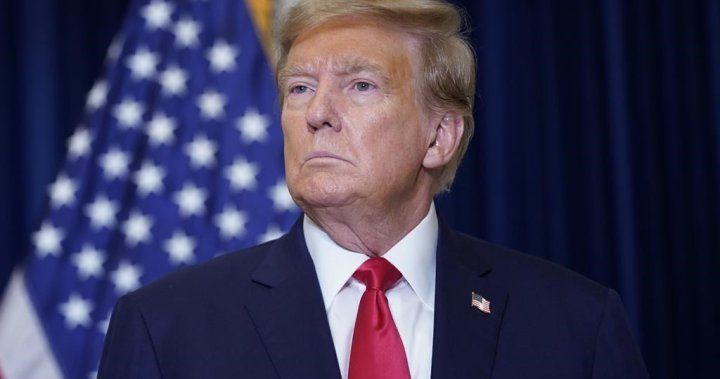ft
The U.S. Supreme Court is set to hear arguments Thursday on whether Donald Trump is eligible to run again for president — and the fate of both his candidacy and the 2024 election campaign are at stake.
Trump is appealing a Colorado Supreme Court ruling that he is ineligible to return to the White House because he violated a provision in the 14th Amendment of the U.S. Constitution preventing those who “engaged in insurrection” from holding office. The Colorado court agreed with the plaintiffs that Trump’s actions before and on Jan. 6, 2021, amounted to an insurrection against the government that sought to overturn the election Trump lost.
The lawyers behind the case are now hoping the U.S. Supreme Court will agree, which would officially remove Trump — who’s largely expected to win the Republican primary that’s already underway — from the primary ballot in Colorado and potentially other states as well. Trump, his legal team and his staunchest defenders argue the case amounts to election interference, allowing courts to make a decision that should be up to voters.
That thorny nest of issues makes the case a fraught one for the Supreme Court to consider. The court has never before considered the 14th Amendment provision before, which will make their eventual ruling a historic precedent for the country.
“We’re asking the Supreme Court to uphold the rule of law in the Constitution and reach a decision based on the facts, law and history in this case. And if they do that, we’re very confident in the outcome,” Eric Olson, a lawyer for the plaintiffs who argued the case before the Colorado Supreme Court, told Global News in an interview.

2024 U.S. election: Trump-Biden presidential rematch met with fatigue by voters, polls show
What is the 14th Amendment provision at issue?
The 14th Amendment of the Constitution was enacted in 1868, shortly after the U.S. Civil War. Section 3, the provision at the centre of the case against Trump, reads in full:
“No Person shall be a Senator or Representative in Congress, or elector of President and Vice President, or hold any office, civil or military, under the United States, or under any State, who, having previously taken an oath, as a member of Congress, or as an officer of the United States, or as a member of any State legislature, or as an executive or judicial officer of any State, to support the Constitution of the United States, shall have engaged in insurrection or rebellion against the same, or given aid or comfort to the enemies thereof. But Congress may by a vote of two thirds of each House, remove such disability.”
After the Jan. 6, 2021, attack on the U.S. Capitol, Democrats and many Republicans argued Trump’s conduct that day and in the weeks leading up to it amounted to leading or supporting an insurrection.
Get the latest National news.Sent to your email, every day.
After Trump announced his re-election campaign in November 2022, lawsuits were filed in multiple states seeking to bar Trump under Section 3. So far, state courts have rejected those cases, or are now waiting until the Supreme Court rules.
The Colorado case initially failed as well, though the district court did agree that Trump had “engaged in insurrection.” The ruling was appealed by the plaintiffs — all Republican or independent voters — and the non-profit Citizens for Responsibility and Ethics in Washington, and the Colorado Supreme Court ruled 4-3 in their favour, becoming the first court ever to bar a presidential candidate under the so-called “insurrection clause.”
Maine became the second state to disqualify Trump under Section 3 in a decision by Secretary of State Shenna Bellows, who is allowed to make such rulings under state law. Trump is appealing that decision in Maine’s courts.

Will other U.S. states block Trump from presidential ballot in Maine, Colorado’s footsteps?
Olson — who won’t be arguing before the Supreme Court on Thursday but will be present at the plaintiff’s table — says he’s hopeful the high court will reinforce the clause, which he says is a matter of upholding the Constitution.
“(Section 3 says) if you promised to follow the Constitution and then broke that promise, you cannot be in government again. That’s all we’re asking the court to enforce,” he said.
Trump’s lawyers have repeatedly argued that Section 3 as written in the 1800s was not meant to apply to the presidency, which they contend is not considered an “officer of the United States.”
They have also focused on the language used in the provision on the oath taken by people it seeks to disqualify. Section 3 says those who take an oath to “support” the United States, but the presidential oath doesn’t use that word. Instead, the Constitution requires presidents to say they will “preserve, protect and defend” the Constitution.
Beyond the semantics of the language in Section 3, Trump’s lawyers have also argued he was exercising his free speech rights after the 2020 election by claiming his loss was illegitimate despite overwhelming evidence to the contrary. They also point out Trump was acquitted by the U.S. Senate in his impeachment over Jan. 6 and that no criminal court has convicted him of insurrection.
Notably, neither the federal nor Georgia indictments against Trump over his attempt to overturn the 2020 election results accuses him of engaging or inciting an insurrection.

What could Colorado’s disqualification of Trump from 2024 primary ballot mean for Republicans?
But Olson points out that, even though Trump was acquitted, a majority of Senators still voted to convict him over the Jan. 6 attack, as well as a majority of the U.S. House of Representatives that impeached him.
He also rejects Trump’s claim that the case subverts the rights of voters to decide if his conduct makes him unfit for office again.
“Voters did decide in 2020 who should be our next president, and Donald Trump refused to accept the will of the voters and instead incited this insurrection on Jan. 6th. That’s the whole basis for this claim,” he said.
It’s nearly impossible to predict when the Supreme Court will rule, but time is of the essence. Colorado and 14 other states will hold their primaries on March 5, putting pressure on the court to release its decision before then.
If the court rules in the plaintiffs’ favour, that could lead to Trump’s removal from the primary ballots in other states where Section 3 lawsuits are before the courts.

Is Trump a lock for Republican nominee as 2024 primaries approach?
The court may fully reject the case and rule for Trump, however, which would bring an end to those other state challenges and ensure Trump’s candidacy can continue.
A third possibility would see the court effectively punt and not make a final decision on whether Trump is qualified to serve as president under Section 3, and determine that it’s up to Congress to enforce the provision — an argument that the initial Colorado ruling included.
That would not only keep the other state legal challenges alive, but also open the door to future lawsuits under Section 3 in the future — creating a potential patchwork of decisions in future elections.
Olson said anything less than fully upholding the Colorado Supreme Court decision would be “calamitous” for the country.
“We live in a constitutional democracy, and our democracy has rules and procedures that ensure our democracy is enduring and durable. And this is one of those rules and procedures when it says, if you were an insurrectionist, we’re not gonna let you back into government again,” he said.
















